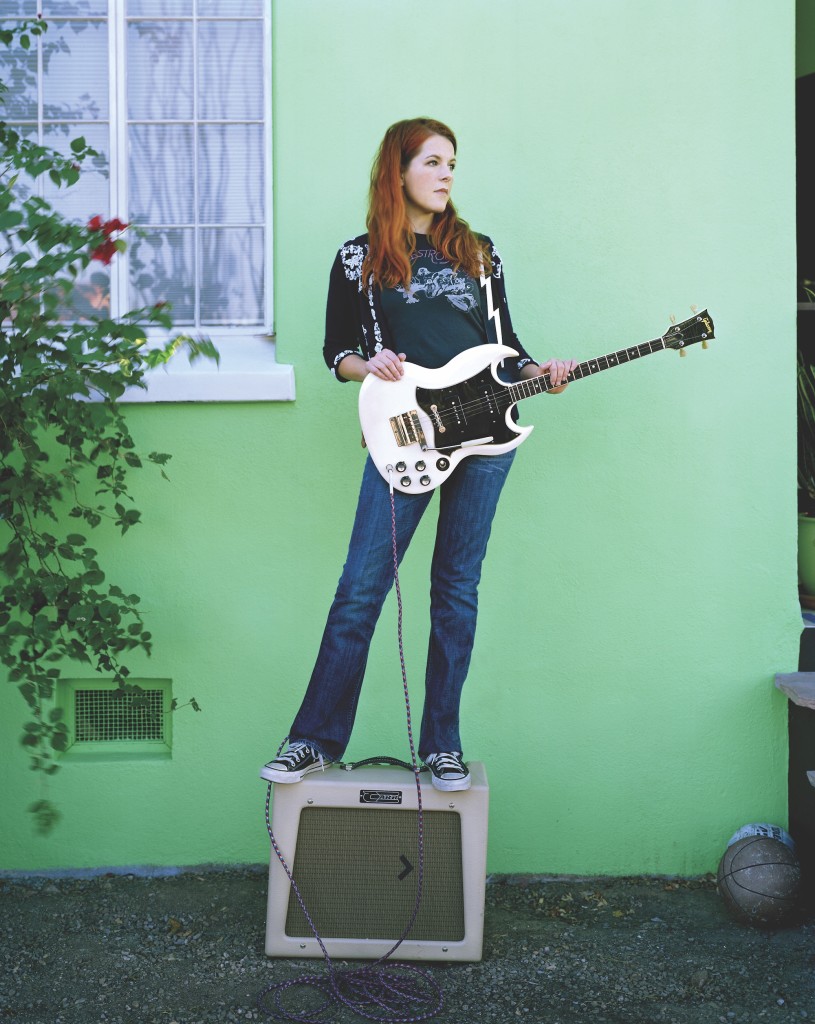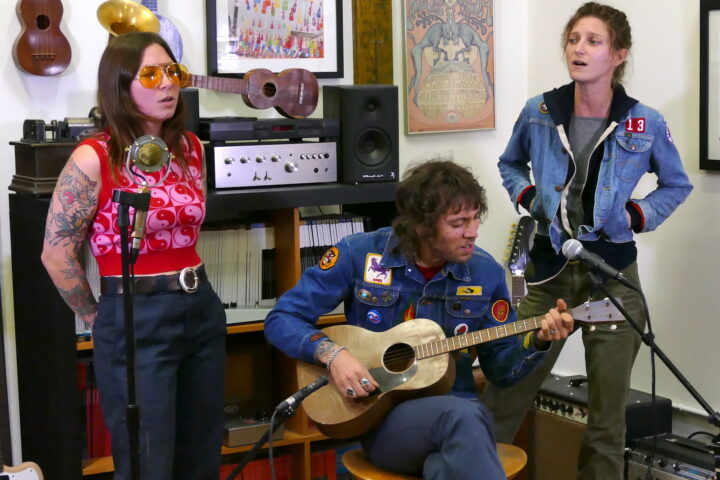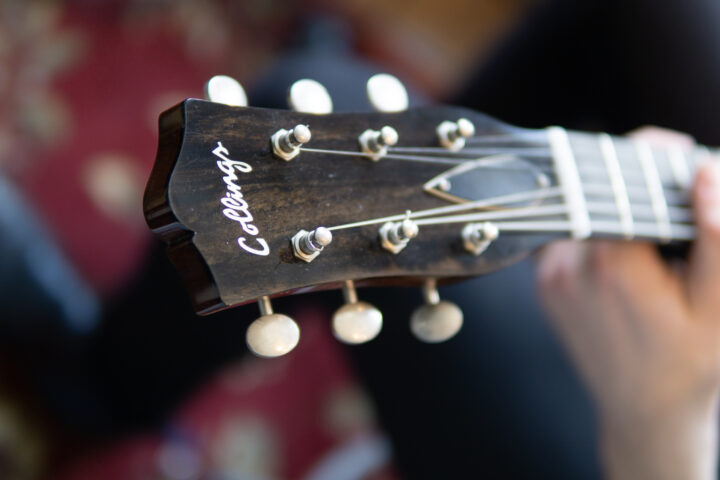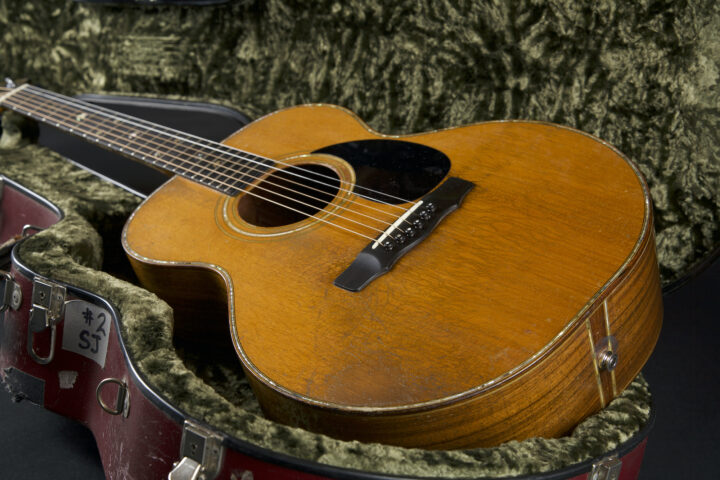Fresh from putting the finishing touches on her new album, Fox Confessor Brings the Flood (Anti- Records), Neko Case is still puttering around Tucson, home of her recording studio. It’s the calm before the touring and publicity storm that happens whenever she puts out a new CD, and this new one–a sprawling affair that features a multitude of special guests, including the Band’s Garth Hudson–will be no different. While her pet greyhound, Lloyd, sleeps soundly in a corner of the room, she assesses all the gear that made it onto the record. It’s an enviable collection of cool guitars and rare amps. It’s even more staggering when you realize that only a few guitars in her arsenal actually have six strings. These are nearly all four-stringed tenor guitars.
Case is a critically acclaimed singer-songwriter, a darling of the indie-rock circuit and the mastermind behind four wonderful albums. She has some of the best vocal cords of anyone singing today, and whether she’s performing Bob Dylan’s “Buckets of Rain” in an intimate club performance or delighting a crowded audience with her side-project power-pop band New Pornographers, she gets heard. Her first solo project, 1997’s The Virginian, was firmly rooted in the world of alt-country. Since then, her CDs have become more far-reaching, incorporating gospel, rock, blues and just about everything in between–critics, in vain attempts to find an apt description, have compared her with everyone from David Lynch to Loretta Lynn. She may just be the best advocate the tenor guitar will ever have.
Walking through her collection, Case becomes a beaming tour guide, offering ample stories and even helping out with the photo shoot (we ended up using her guitar photos). She’s only been playing for about five years, but don’t let that fool you–she already knows quite a bit about guitars. Hearing her talk about them is like hearing proud parents talk about their kids. These are not only her guitars, they’re her “buddies,” and she knows their histories inside and out.
Case admits she stumbled upon the tenor guitar by sheer luck. “It was 2000, and I had made part of Furnace Room Lullaby at my friend Don Kerr’s studio in Toronto,” she says. “He had a tenor guitar and I had never seen one before. For years before that I had tried to play six-string guitar, but I have really tiny little hands and I could never really get going enough for it to sound like music. It was really hard for me to stretch my fingers like that. I just remember picking [the tenor] up and my hand fitting around the neck so perfectly. So I went home to Seattle and I bought a tenor guitar [a Gibson TG-0].”
After playing the Gibson acoustic for a while, Case went after something a little harder to find: an electric tenor guitar. “I realized on tour that I was having a hard time being heard amongst my amplified brethren and I thought I could really use an electric guitar,” she recalls. “My friend [Chicago musician] Andrew Bird was the first one to tell me that he saw an electric tenor guitar in a store in Chicago. The store is really terrible and it’s run by an evil guy, but I went in. It was the weirdest story.”
The guitar was a vintage Gretsch Duo Jet tenor from 1959. “I went into the store and asked about the guitar, and the guy was really snotty with me,” she remembers. “He said, ‘I’m saving that guitar for Rick Nielsen of Cheap Trick!’ And then I heard this voice go, ‘Let her try it out, he’s probably not even going to buy it!’ It was Tom Petersson from Cheap Trick, who happened to be in the store! And he saved my ass. The store owner didn’t want to look bad in front of Tom, so he let me try it and I loved it. I started making payments on the guitar. The owner was such a weird, cocaine cowboy–I don’t know if he’s a cokehead or not, but he sure acted like one–he was really condescending and alienating. And he tried to tell me the guitar was part of the Tsumura collection, which I kind of believed, but I’ve seen the Tsumura collection books and my guitar isn’t in there. What he didn’t realize was that the guitar had belonged to Ry Cooder. There was a receipt for Cooder in the case from a repair store in Los Angeles!
I had to pick up the guitar right before my 30th birthday, and it was funny because I had show in London,” Case says. “It was my first time I had ever been to London, the show was on my birthday, I get the Gretsch on stage and it doesn’t work! I was so angry. I took it back to the store’s repair shop three times and the metalhead guitar dudes couldn’t figure it out, so finally I opened it up myself and noticed it wasn’t grounded properly and I fixed it myself, which I should have done in the first place. It just goes to show you that it’s really good to stay away from those kinds of guitar stores.”
Case hasn’t stopped there. Over the next couple of years, she added to the stable a Martin 5-17T, an ultra-rare 1958 Gibson Les Paul tenor (TV yellow), a couple of National tenors (an early tricone resonator model and a later, wood-bodied model with pickup) and, finally, a rarer-still, custom-ordered 1967 Gibson SG Special tenor with two original four-pole P-90s. The instrument was purchased from Elderly Instruments in Michigan. It quickly became a favorite, and she’s put it to non-stop use since about a week after it came off their wall. “It’s been my main guitar,” she says. “It’s the best sounding electric I have, for sure. The Gretsch sounds as good but the Gretsch sounds different, and I don’t want to take the Gretsch on the road any more. The SG is light, it sounds great, the pickups are great. It’s been my buddy.” It should be noted that Case has started to play the six-string now, too and already has a good vintage collection of those in the works, including a Gibson Hummingbird, an Epiphone Texan and a Fender Jazzmaster.
Case has even found a niche in her amp collecting with some odd, but hip, choices. She’s the rare musician who doesn’t own a Marshall or a Fender Twin or any of the usual suspects. “I started out with a Vox Pacemaker, which I really love,” she says. With an EL84-driven, single 10” speaker, Vox never really caught on with the mainstream as a tube amp, but it still puts out a respectable 17 watts of power and has the classic Vox sound. “I had to use a Gibson reverb tank with it because it didn’t come with reverb, which is pretty essential,” she explains. “I’ve since moved on to a Carr Rambler amplifier because it’s a lot sturdier and more reliable. My Vox is getting old, it’s been on the road for so many years and the Carr is great. It has all the power I need, the sustain and the reverb are just untouchable. It’s small but it’s fucking loud. I’m not the kind of person who needs a great deal of balls, but it gives me a great deal of balls nonetheless. That’s all I use. I don’t use any pedals or anything.”
Case also has a soft spot for vintage Garnet tube amps–going so far as to pay tribute to them with one of her projects (the self-released EP, Canadian Amp). “I was turned on to the amps by Dallas Good of the Sadies,” she says. “He plays Garnet amps and he has a great sound.” When her musician pal Reid Diamond of Shadowy Men on the Shadowy Planet succumbed to cancer in 2001, his Garnet Revolution One found a new home at Case’s house.
“One time, when I was Winnipeg, I decided to see if I could go find “Gar” Gillies [the founder of Garnet],” Case remembers. “I knew he still had a workshop there. And I went in and he has this little two-room shop in Winnipeg. His company used to be huge; he had Randy Bachman as an endorsee! He showed me this great book of all their old ads from the ‘70s. He still makes the Randy Bachman Herzog [a pre-amp effect box that helped Bachman find his classic sound], he makes like 12 of them of a year or something.
“And he has this amp repair business,” Case continues. “He seems so happy working in this small space. You walk in, and he actually has a hospital gurney for sick amps that he puts them on before he wheels them into the other room! It was so amazing. He ended up giving me a Celestion speaker to put in my Garnet. It was a Celestion from the ‘50s, which had been owned by the guy in Brandon, Manitoba, who made Johnson amps. After he died, his widow sold off all his stock, and Gar went and bought a bunch of these Celestion speakers from the ‘50s. And Gar just gave me one! He was the sweetest guy.”
It’s one thing to own a lot of gear and another thing to use it. It’s been four years since Case’s last studio album, Blacklisted, but she’s kept herself plenty busy. She’s been performing as a vocalist for the lauded indie band New Pornographers, she recorded a live album with the Sadies (The Tigers Have Spoken) and did plenty of touring to support it. And, of course, she’s been using all those guitars to write the songs for Fox Confessor Brings the Flood.
“My friend once told me that every new guitar has 10 new songs in it,” she says, “which isn’t a reason to go out and buy new guitars. But I’ve found that when I started collecting instruments that I became more and more interested in trying to sit down and write music, which is my job.”
The new combination of the tenor SG and the Carr amp resulted in a bit of a creative burst. Her new album took a little longer than planned to record, but it came out just as she was hoping. When asked just how many hours were spent in the recording studio, Case demurs: “I don’t even want to think about that. I could look at the receipts, but I think that would be a mistake.”
Her song output varied dramatically. “Sometimes I’d write three at a time, sometimes I’d write one song in four months,” she says. “I also decided on this record to branch out a little bit and to purposefully write songs with other people, so I spent a lot of time with the Sadies, writing with them on The Tigers Have Spoken. We even went out of our way to get together and write more songs for this record. There are three songs on there that I cowrote with the Sadies, and it really mixes it up. You can get really lonely writing by yourself. It’s good to know that you can do it but sometimes you just want that band feeling. You want to be there with other people creating and hearing their input.
“Sometimes it’s as simple as somebody playing the D to the B7 for you a few times while you’re not playing it, so a certain part of you can go off someplace else. It really frees you up–all those things about teamwork that they say are definitely true.”
In the end, the new album included an army of musical friends joining her. Rachel Flotard of Seattle’s Visqueen lends guest vocals, the Flat Duo Jets’ Dexter Romweber plays guitar, and members of the Sadies and Tucson’s Calexico join in as well. This is in addition to Case’s full-time lineup, which includes pedal-steel player Jon Rauhouse, upright bassist Tom V. Ray and Vancouver-based guitarist Paul Rigby. And then there’s an extra special guest, the Band’s Garth Hudson, who played keyboards on a few tracks.
Case laughs it all off. “There was a ridiculous amount of people on the recording,” she says.
“I just had a weird idea one day. I knew Garth Hudson was still around and still playing. And the guy who masters our records, Peter Moore, knows those folks and has for a long time. I asked Pete if Garth would ever consider it. Literally a week later we were picking him up at the airport and taking him to his hotel and going, ‘Holy fuck, it’s Garth Hudson!’”
Despite all the vintage gear, the new CD doesn’t scream “guitar record” at all–there’s far too much subtlety here for that. The album features some of Case’s most interesting, poetic songwriting to date. In many ways, the CD is even harder to describe than her previous discs. Case calls it her “storytelling” record. “I know there was a thread while I was making it, which was Ukrainian fairy tales,” she says. “I was really interested in the way that fairy tales came about, the stories that my grandmother has told me. I like how weird magic stories come out of everyday occurrences that are either tragic or funny or both.” After you hear heartbreaking tracks such as “Star Witness,” “A Widow’s Toast” or “Maybe Sparrow,” the above statement makes perfect sense. Case cites Pops Staples as one of her favorite guitarists, and the Delmore Brothers are influences as well, but the music here is a perfect amalgam of rock, gospel, blues and country sounds. There are probably some jazz vocal sounds in there, too.
Now that the CD is recorded, the singer-songwriter is starting to think about touring and about corralling some heavy-duty flight cases–perhaps her last purchases for a while. “That’s the bummer about tenor guitars,” she says, looking at her tattered cases. “You can’t show up in a town and break your headstock off and go, ‘I really need to borrow a guitar from someone,’ ‘cause nobody is going to have it. And you can’t just go to a six-string and do what you were going to do on a tenor. Or at least I can’t. The tenor guitar songs are tenor guitar songs and they don’t change.”
The road hasn’t always been friendly to Case’s guitars. She launches into a couple of touring stories that would probably make closet collectors cringe. Her Gibson TG-0 suffered the worst travel damage a couple of years ago: “I was standing on the sidewalk in New York City holding my case upright,” she says, “and the case just came out of my hand and fell over on the sidewalk. And that’s all it took. All it did was fall over, and it snapped the neck right off.” She finished her radio spot that day sans guitar and the next day found herself shopping. “I went to Vintage Instruments in Philadelphia,” she says. “They set me up with this Martin guitar (a 5-17T), the luthier put in a pickup for me and she was ready to go.”
The electric Gretsch hasn’t been spared damage either. “America West airlines smashed the bridge on my Gretsch, which nearly sent me into a coma,” she says. “They ruined the case and they smashed the bridge; luckily they didn’t cave in the top. I had my friend Don Windham of Haymaker Guitars [in Phoenix, Ariz.] make me a new bridge and he did a great job.” Case is now hesitant to expose the Gretsch to the rigors of touring; next time around, she’ll probably take the sturdier Les Paul and SG tenors with her.
“I’m going to need two guitars going on the road, because I’m always tuning the things,” she says. “And I don’t ever want to have a guitar tech. I think if you’re a lady playing a guitar, other ladies need to see you playing the guitar, and they don’t need to see men come out and fix your equipment for you. It just looks incredibly pussy. So I just do it all myself.”
Case still doesn’t consider herself a real guitar collector, but she’s not afraid to offer some sage advice to those seeking unique instruments. She’s been burned on sour deals a few times, so she hopes folks will stay away from disreputable stores. She also wants to remind folks that these are tools of the trade and should be used as such.
“I get really into the nerdy gearhead aspect of it, and then the instrument just becomes your friend and you forget all that,” Case says, with a hint of nostalgia. “It doesn’t matter where it came from or how much it’s worth or if it has the original tuning pegs. None of that matters. If you have to replace them to make it work, that’s what you do because it’s your instrument’s job. But you can’t feel bad about that because you still get to take your buddy on the road with you. That’s how I feel about them. I feel about them the way I do my cars–I love them. I spend a lot of time with them.”
But perhaps the best advice she can offer is this: don’t part ways with anything. “During the election [of 2004], Ry Cooder was in town,” Case recalls. “A friend of mine who was a politician was at a rally with him. He called me up to say, ‘Hey, Ry Cooder remembers that guitar [the electric Gretsch]! He’s really bummed out that he sold it, too!’ I passed along the message that if he ever wanted to use it, he could.”



